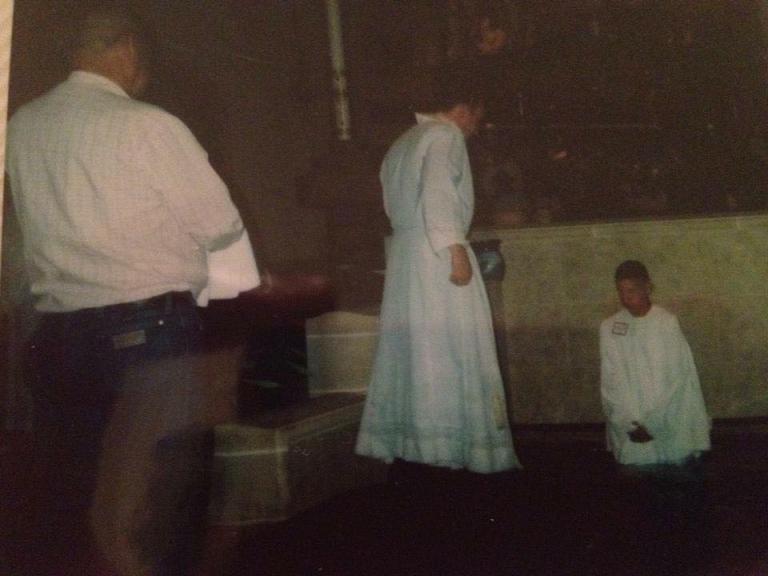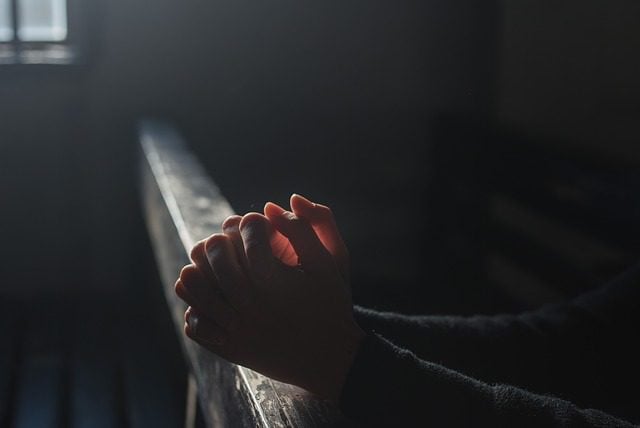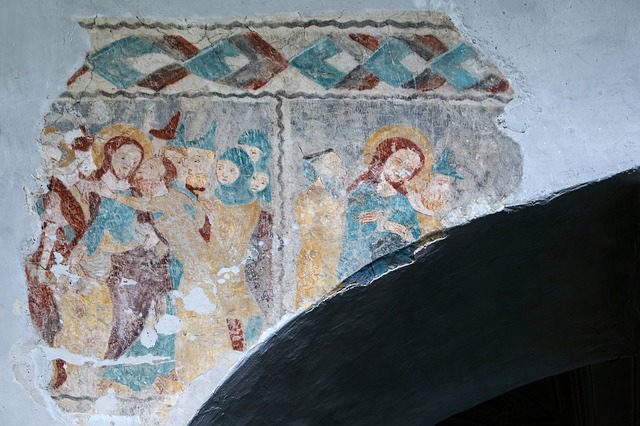
Below is the homily from my son Anthony’s funeral Mass. In case you don’t know, my son Anthony died by suicide on March 8, 2017. Fr. Jonathan baptized Anthony and had a fairly close relationship with and is super close with me and my husband. Father also celebrated my wedding Mass.
The story about the bat goes back to when Anthony was a year old and was bitten by a bat. Because of that, he was scared and also fascinated with bats. During the rosary, a bat came into the funeral home and was flying around. My kids and I all laughed because that was such an Anthony thing.
I hope that this homily helps people, especially priests, start a conversation on Catholic theology of suicide.
Homily for the Funeral Mass of Anthony Gallegos, by Father Jonathan Raia
St. William Catholic Church, Round Rock, Texas
March 17, 2017
I think the question that most often is in our hearts and often on our lips as well, when we’re confronted with the death of our loved ones, especially a death as senseless as Anthony’s, is the question “why?”.
I know it was certainly the question that was on my heart as I stood with the family a little over a week ago in the garage, praying over Anthony’s body.
We know that Anthony had struggled with depression for years, as his journal attests, and talking to Ariana and Leti and the family, we know that in the last hours of his life apparently there was really a fierce battle going on inside Anthony, with the darkness that he described that he felt inside of him.
Knowing that, though, really doesn’t make it any easier to deal with his death. That question of “why?” is still on our lips and still in our hearts.
Why?
What our faith does not try to do is answer that question. Let’s make that really clear.
We joked even the night that Anthony died about the well-meaning but stupid things that people sometimes say to people who are grieving. Things like “God took him,” or that “it was just his time”, or something like that. God didn’t take Anthony because he needed him. There’s not a bat problem in heaven. (There was a bat flying around at the Vigil last night.)
But it wasn’t his time.
It was not his time. And this wasn’t the way that the Lord wanted him to go. I think we have to say that.
So our faith does not try to answer for us the question of “why?”. The answer that our Christian faith does give to us, the only answer, is the answer that is a Person.
It’s the Person of Jesus Christ, God who became man for our salvation. God who suffered and died to free every single one of us from death. It’s Jesus, the answer, who when he was on the cross, cried out “My God, My God, why? Why have you forsaken me?”. See, in Jesus, God has said to each and every one of us, “I understand what that ‘why?’ feels like. I know it because I felt it too.”
The one request that Leticia had for me regarding this homily (she’s not afraid to give instructions to priests! I know her, she’s not shy), the one request that she had for me was that I proclaim to every one of you that beautiful truth that Noe, who did our second reading, who is such a beloved spiritual father and teacher in this family here at St. William’s, that beautiful little saying that Noe loves to preach, “God loves you more than you think He does.” God loves you more than you think He does. That was what Leti said: “Tell them that.” So, God loves you more than you think He does.
Wherever you are in your own journey of faith, in your relationship with God and relationship with the Church, God loves you today, now. More than you think He does. Much, much more.
So where was God in Anthony’s final days, in his final moments here on earth? Jesus was battling inside of him. Jesus was battling inside of him, giving him the resolve to marry Ariana in the Church, to be a good father to Aaliyah and Camryn. To keep his faith at the center of his life. He wrote those things down. Jesus was right there and although it might seem to us today that the darkness won that battle inside of Anthony, we are here in this church this morning because we believe that the war has in fact already been won.
St. John proclaims to us, “The light shines in the darkness, and the darkness has not overcome it.” The light shines in the darkness, and the darkness has not overcome it.
See, the symbols right now that surround Anthony’s body—the Paschal candle, the pall—remind us that right over there in that font, seven years ago, Jesus Christ, the light of the world, came to dwell in Anthony’s heart. I had the great privilege to baptize him, along with Dan, and Gabe, and Felicity.
And on that night, God the Father looked at Anthony and said, “You are my beloved son. You are my beloved son.” The same words that we just heard the Father say to Jesus at the Transfiguration. On that day of his baptism, Anthony received the gift of faith, and Jesus promised him a share in his own victory over death. We are here today to beg the Lord Jesus to remember that promise.
The readings that the family chose are actually the readings that we just listened to on Sunday, the first time that they were here together as a family in this church after Anthony’s death. Those were the readings that we heard, and we heard them again this morning.
So at the beginning of Lent, every year on the Second Sunday of Lent, the Church, after reminding us on the First Sunday that Jesus was tempted, that he battled with the devil, because we all have to, on the Second Sunday, the Church gives us this strange and wonderful gospel about the Transfiguration.
See, Jesus knew that he was going to suffer and die. He knew how that experience would devastate his friends, how it would shake their faith to its core. So on the way to his death, Jesus took his three closest friends up the mountain and gave them a gift. He let them see just for a moment who he really is.
The Church has always understood that at that moment, in revealing the glory of who he is as the eternal Son of God, to those three chosen disciples, Jesus was preparing them. He was preparing their hearts to watch him be mocked, and crowned with thorns and scourged, and executed as a criminal. In the depths of that darkness on Mt. Calvary, he wanted them to remember the light on Mt. Tabor. How the glory of his Father’s love for him so filled him that it made him shine like the sun. He wanted them to remember that as they watched him die so that they could trust that maybe even on that cross, Jesus was still God’s beloved son.
But see, the story doesn’t end with the cross. We know that none of what we are doing here today would make any sense if it ended there. The reason that we are here today is that Jesus rose from the dead. Death no longer has any power over him. And in his Church, through baptism, Jesus has shared that victory with us—his victory over death.
If we allow Jesus to love us, to save us from our sins, and we give our lives to him and live in him, then we too can live forever. That’s the hope that we have today for Anthony. That’s the hope that the Church gives to each one of us.
So what does our faith do for us in a time like this? To that question of “why?”, to the pain and the confusion and the sadness and the anger and the fear and the doubt in our hearts, Jesus says, “I understand. I know. I know what that feels like.”
And it’s actually there that he’s closest to us. It’s there that he’s closest to us. Where maybe we feel farthest away from him, in fact, it’s there that he’s closest to us, if we have the eyes to see it.
You know, sometimes our Protestant brothers and sisters ask, “Why do you Catholics always have Jesus on the cross? He’s risen from the dead.” That’s why. We keep the image of Jesus crucified always before us so that we will never forget that he understands what it’s like.
But it’s not simply that. It’s not just that Jesus meets us in that way. He does something more. Just as he did for Peter and James and John on Mt. Tabor, Jesus offers to us a glimpse of the end game, where this is all headed.
We know that the Jesus on the cross, the Jesus who suffers still with us and in us is also the Jesus who lives forever in heaven with the Father, and who has promised to take us to be with him. That’s our hope. Remember at the end of that gospel we just listened to, Jesus tells the disciples to keep the vision to themselves until he is raised from the dead. See, he wanted them to go and give strength to his followers so that they can know that God knew what He was doing. That the victory was won already when Jesus was there on the cross.
He meant for them to console each other in their trials, in their own experiences of Calvary. To console each other with the knowledge that God can use even this for my good, for my salvation. Because he loves you more than you think He does.
St. Paul understood this. That’s why in the second reading we heard, he tells his disciple Timothy, “Bear your share of hardship for the gospel with the strength that comes from God.”
That strength is the light of faith that God gives to each one of us at baptism. It is the light that shines from Jesus on Mt. Tabor, the light that shines from his wounded hands and feet and side, wounds that he still has even in his glorified body. It’s the light that God has shown to Anthony’s family this past week, through the beauty of this community and faith.
And that light is what we now have to share with Anthony by our prayers. See, we’re also here today because we can do something for him. We believe that death doesn’t end the bonds that are formed in this life, because love is stronger than death, and so love remains. You and I have a job to do. We commend Anthony to God because we know that God loves him, more than any of us ever could.
Pope Benedict [in his encyclical Spe Salvi] had a beautiful image that, in praying for the souls of the dead, the souls in purgatory, we are asking God to put the pieces of their lives back together again. We here today are asking God to put the pieces of Anthony’s life back together again. We pray that Jesus’ gaze of love and the love of his heart will purify Anthony’s heart, to love the way that he was made to love. We pray that the holy pain of that gaze of Jesus’ eyes and the love of his heart would cleanse him and really make him truly himself. That’s what purgatory is all about: becoming who we truly are in the love of Jesus that purifies us.
So brothers and sisters, God truly loves you more than you think He does. Jesus came so that you and I would know that love. And even though his Church, Jesus wants to give us the strength to live every moment with the hope that only comes from knowing that Jesus has risen from the dead, that the light shines in the darkness, and the darkness has not overcome it. As we pray that that light will shine upon Anthony and bring him into glory, we pray also that we will live in that same light. We pray that we can know the hope of that light in the trials of our lives so that we can come to live one day in that same glory.
Amen.










